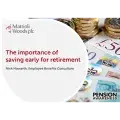As parents, we strive to do everything we can to give our children a bright and prosperous future. One of the most important things we can do is to save money for their future needs.
No matter how young your child is, saving for their future is imperative. Here are some reasons why saving for your child's future is so essential:
Education expenses
Education is one of the most important investments you will ever make for your child. A university education can be expensive, and saving for it can make all the difference in your child's future. Saving for your child's education can reduce the need for your child to take out student loans and help them avoid starting their post-grad life in debt. The earlier you start, the easier it will be to build up a sizable pot for when they need it, without it putting too much pressure on your own finances.
Emergencies
Life is unpredictable and emergencies can happen at any time. Saving for your child's future ensures they will have a cushion to fall back on when they need it the most. It could be medical emergencies, or any other unforeseen expenses that come their way.
Major milestones
Every parent wants to give their child the best possible start in life. Be it buying their first car, getting married, or starting their own business, saving for your child's future ensures they are well equipped to take on these milestones with financial freedom.
Generational wealth
By saving for your child's future, you are creating a pathway for generational wealth. Just as you want your parents to leave a legacy for you, you have an opportunity to pass down financial security to the next generation.
Teaching responsibility
Saving money for your child's future instils the concept of responsibility in them. Children who grow up learning how to save and manage their money tend to become fiscally responsible adults.
In conclusion, saving money for your child's future is crucial for their overall financial stability. It takes effort and commitment, but by planning early with your financial adviser and sticking to a budget, you can create a solid financial future for your child.
Junior ISAs
A great solution and starting point is a Junior ISA, or Junior Individual Savings Account [JB1] (JISA). This is a type of savings account designed specifically for children in the United Kingdom that was introduced in 2011 as a replacement for the Child Trust Fund, and offers a tax-free way for parents, family members and friends to save money for a child's future.
There are two types of Junior ISA: cash Junior ISAs and stocks and shares Junior ISAs. A cash Junior ISA works much like a regular savings account, with interest earned on the deposits made. A stocks and shares Junior ISA, on the other hand, is invested in a range of assets such as stocks, shares and bonds, with the aim of providing greater returns over the long term.
The main advantage of a Junior ISA is the tax-free savings that it offers. Any interest or investment growth is not subject to income tax or capital gains tax, meaning any money saved in a Junior ISA is entirely free of tax. Another benefit of a Junior ISA is that the money saved in it belongs exclusively to the child. This means parents or grandparents can save money for their child or grandchild's future, removing the temptation to dip into it themselves.
In terms of contributions, anyone can contribute to a child's Junior ISA, including parents, grandparents, other family members and friends. There is a limit on the amount that can be deposited each year, which is set by the Government. For the tax year 2023-24, the Junior ISA allowance is £9,000 (this resets on 6 April each year).
Many young adults who have not been fortunate enough to have benefited from any savings from their parents or grandparents have found themselves struggling financially to buy their first car or home, as well as getting weighed down with debt from university costs. It has also become more common for young individuals to invest any surplus funds they have into higher-risk investments with lack of knowledge or experience. This is further encouraged by social media and the pressure on young individuals nowadays.
With the help of your financial adviser, you can put a strategy in place to ensure your children are on the right path to having a pot of money that can give them a head start in life, as well as sound financial and investment advice. If you are looking for a stocks and shares Junior ISA, Mattioli Woods has a team of in-house investment managers who actively manage our investment portfolios. We offer a variety of different investments for our clients and their children to invest in, depending on their needs and risk appetite. As your children get older, we can adjust the risk profile as appropriate, thus providing a truly bespoke strategy for them.
A great, easy way to open a Junior ISA for your child is through your bank or building society, or via a regulated investment app. Mattioli Woods have launched our own investment app, called MWise app. Investment apps allow for the cash to be invested in-line with a suitable portfolio based on your attitude to risk and capacity to bear capital losses. Apps such as MWise allow you to track performance too, which is great.
Currently almost £20 billion is loaned to around 1.5 million students in England each year1. The value of outstanding loans at the end of March 2022 reached £182 billion. The Government forecasts the value of outstanding loans to be around £460 billion (2021‑22 prices) by the mid-2040s.
The forecast average debt among the cohort of borrowers who started their courses in 2021/22 is £45,800 when they complete their course. Forecast debt is expected to be lower for those starting in the reformed system from 2023/24, at £43,400. The Government expected that around 20% of full-time undergraduates starting in 2021/22 would repay them in full. They forecast that after the 2022 reforms this would increase to 55% among new students from 2023/24. Therefore, by starting to invest for them now in an ISA structure, you can make covering those costs easier in the future, especially as any investment returns are free from liability to income tax and capital gains tax for both you and your child.
Overall, a Junior ISA is a great way for parents, family members and friends to save for a child's future in a tax-efficient way. It provides a nest egg for the child's future and with the tax-free savings on offer, it is a smart financial choice for any parent or grandparent. However, as with everything in life, there are pros and cons that you should consider before opening an account.
Pros
Tax-free savings
The Junior ISA is a tax-efficient way to save for your child's future. Any interest, income or capital gains made on the investment are tax-free. This means the investment can grow faster than if the same money was held in a standard savings account.
Parental control
The parent or guardian who opens the Junior ISA has control over the investments until the child turns 18. The money in the account cannot be withdrawn by the child, so there is less risk of money being spent impulsively.
Long-term savings
A Junior ISA is a long-term savings account for a child, which is designed to help them towards future expenses, such as university fees or a deposit on a house.
Cons
Limited contribution
There is a limit on the amount that can be paid into a Junior ISA each year. For 2023/24, the limit is £9,000.
No access until age 18
The money in a Junior ISA cannot be accessed before the child turns 18. This means if the child needs the money before they reach 18, it will not be available to them except in exceptional circumstances, such as if the child becomes terminally ill.
Market risks
As with any investment, there are risks involved. The value of the Junior ISA investments can go down or up, which means you may not get back the full amount invested. It is important to remember that investments can be volatile, which means there may be highs and lows in the market.
Childhood pensions
Giving your children a head start in life financially, by saving as they grow up, should help them to be more financially secure, allowing them to take control of their pensions from a younger age, rather than putting this off to get by each month. Furthermore, they should understand the value of advice and investing from a young age, reflective of the strategy you had adopted for their Junior ISAs for example.
Encouraging your children to save into their pensions early is not always an easy task; they may not deem pensions to be important, given they cannot access the funds until at least age 57 under current legislation. Pensions can also be complex and because of the lack of education, the younger generation may not realise the power of funding their pensions in their younger years, the benefits of compound growth, or the benefit of having the right investment management.
Many of our clients may wish to incorporate their children into their pension planning. As such, we have developed multi-member pension arrangements, allowing our clients’ children to consolidate or build their retirement fund in a family pension arrangement. This means our clients’ children can have the benefit of receiving advice and investment management while benefiting from only having fees associated with their share of the fund rather than the full cost themselves.
Again, there are pros and cons to everything, so do your research thoroughly, or speak to your financial adviser before making your final decision.
Pros
Compound interest
Pensions offer the benefit of compound interest, which means the interest earned on your contributions is reinvested. It could also earn interest, leading to a long-term growth in your savings.
Longer time horizon
Starting to invest in a pension earlier in life gives you the advantage of a longer time horizon. This increases the potential for more significant returns on your contributions.
Tax benefits
Pension contributions receive tax relief, which means that for every contribution made, the Government adds money. Also, any returns earned on the investment are tax free, until you start taking money from the plan.
Cons
Inflexible contributions
Pensions are long-term savings vehicles, so your children will not be able to withdraw your contributions until they are 57 years old.
Economic uncertainty
As with any investment, there are risks involved, and the value of the pension fund can fluctuate. Market volatility can impact the returns on investments, and the future performance of the assets cannot be predicted with certainty.
It is important to note the benefits of saving into a pension early often outweigh the cons, but you should consider your individual circumstances and financial goals before making an investment decision. Professional financial advice is also recommended to help you choose the best option for you, based on your specific needs and goals.
[1] https://commonslibrary.parliament.uk/research-briefings/sn01079
All content correct at time of writing.

































































































































































































